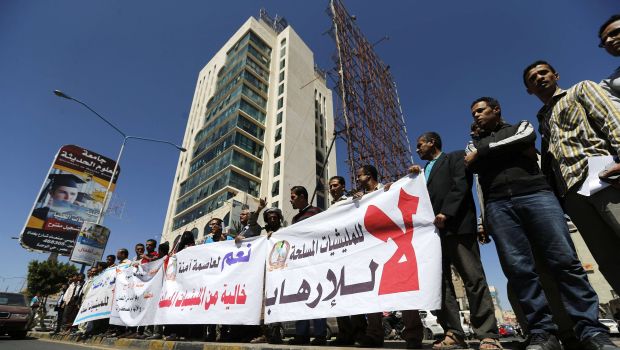
Protesters demonstrate against militancy and violence in Sana’a October 21, 2014. (Reuters Photos)
The movement, currently in control of large parts of northern and western Yemen, is putting pressure on the central government in Sana’a in a bid to assume greater powers in the finalization of the constitution that is supposed to lay the ground for the creation of a federal government in Yemen, source who spoke on the condition of anonymity told Asharq Al-Awsat.
The constitution is set to be drafted in November, and is the next step in a lengthy political transition process that began in the wake of the toppling of the country’s former President Ali Abdullah Saleh in early 2012.
The latest development comes the Houthis attempt to extend and consolidate their control over substantial parts of Yemen, the Arabian Peninsula’s poorest and most troubled state, in the wake of their takeover of the capital Sana’a in September.
The takeover followed a month of Houthi-orchestrated protests that brought the city to a standstill and led to sporadic violence between protesters and government security forces.
The political crisis triggered by the Shi’ite groups occupation of the capital was resolved when Yemen’s President Abd Rabbuh Mansur Hadi agreed to appoint a new premier and new cabinet with Houthi-approved members, and cut fuel prices.
However, reports say that despite the deal, Houthi fighters have carried out reprisals against figures linked to the movement’s political rivals, especially the Al-Islah Party, such as demolishing the houses of its leaders.
On Wednesday, Houthi fighters stormed and looted the headquarters of the National Congress for Youth in Sana’a on Wednesday. In a statement the congress denounced the “barbaric and violent practices of the [Houthi] group,” which it said “demonstrates the lows the group has reached.”
The movement’s attempts to spread its influence across Yemen has also stirred up a backlash against it, from both local groups suspicious of outside factions and sectarian attacks from Al-Qaeda in the Arabian Peninsula, which regards the Shi’ite Houthis as heretics.
Members of the Hirak Al-Tuhami, an anti-Houthi group based in the Hudaydah governorate, said there is a complete consensus against the presence of Houthi militias in the western province.
Over the past few days the governorate has seen public protests against what residents described as “provocations” by the Shi’ite militants against civilians.
Violent clashes erupted on Wednesday in Bayt Al-Faqih district as Houthis and local fighters exchanged fire. Fighting broke out near a local gas station and a Houthi militant was injured, prompting the group to flee the city, a source who requested anonymity told Asharq Al-Awsat.
Eyewitnesses told Asharq Al-Awsat that Houthi militants have deployed across the streets of the Hudaydah city as part of their aim to control the western province, home to a key Red Sea port and located near the strategically-important Bab El-Mandeb Strait.
Elsewhere, the southern secessionist movement known as Al-Hirak stepped up protests in the city of Aden as its members continued a sit-in protest that began on October 14.
Al-Hirak and its members aim to achieve independence for Southern Yemen, formerly a separate state, which unified with North Yemen to create a single state in 1990.
Asharq Al-Awsat visited protests camps in the Aroud square in Aden and met with a number of southern activists who said they will not leave until their demands of “liberating the South” are met.
Eyewitnesses also told Asharq Al-Awsat that unknown fighters in unmarked cars have deployed on the streets of the city.
The men, dressed in military uniforms, are members of militia forces known as People’s Committees and were operating in coordination with security services in order to preserve security at the Aroud square, Aden’s deputy security director Maj. Gen. Naguib Al-Mlaghlas told Asharq Al-Awsat.
When asked about protesters’ demands, Mlaghlas said any political demands should be made through official channels in a civilized manner, but said that the security services in the province will protect any sit-in on the condition that it has realistic demands and does not negatively impact people’s lives.
Moahmed Al-Hashemi contributed reporting from Aden. Wael Hazam contributed reporting from Hudaydah.

Trackbacks/Pingbacks